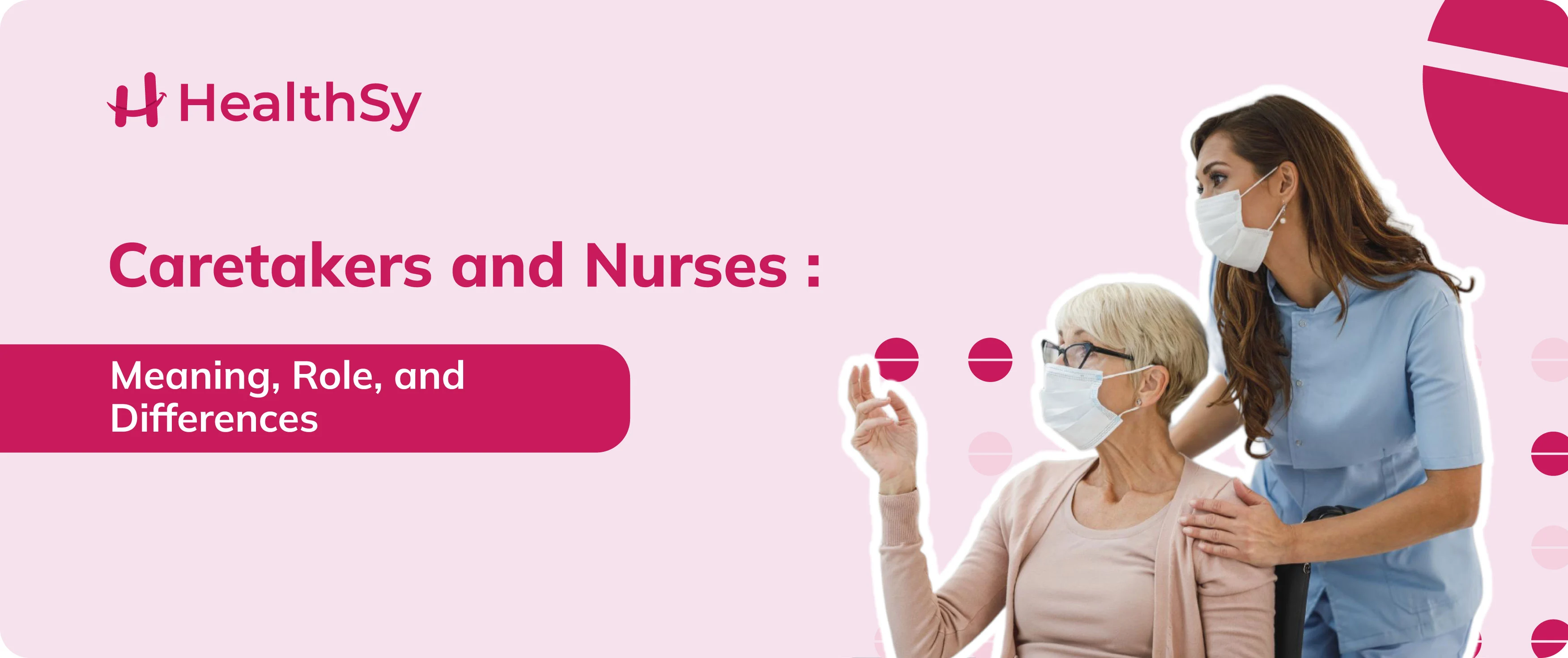Caretakers and Nurses: Meaning, Role, and Differences

Every person is born with the innate ability to feel affection and show
concern towards others. Having family members around can be helpful when you
are going through a tough time and need some extra support. So, the primary
responsibility is to take care of them. But it can be difficult to manage
work schedules while caring for children and elderly, disabled, or bedridden
family members. They need the help of a person who can give them undivided
attention and care to maintain a regular schedule.
In situations like these, it can be helpful to consider external support like
home healthcare professionals to receive help and ease tension.
‘Caretakers and Nurses’ are skilled experts who are certified to offer
important support and care to people with special needs. They can help manage
medications, aid with daily activities, and provide
emotional support to both the patient and their family members.
Sometimes,
distinguishing between the roles of caretakers and nurses can be difficult, and is important to understand the differences to ensure that
individuals with special needs receive the proper level of care and
support.
If you are confused about how to
choose the best assistant, your doubts will be clarified in this blog. Let us
get started!
Caretakers
A caretaker is a qualified person
who takes responsibility for the physical and emotional requirements of a
dependent individual.
They help people by doing things
like cooking, cleaning, and errands for them. However, they have no right to
carry out any kind of healthcare or medical related tasks.
Role and Responsibilities of a Caretaker
1. Personal Hygiene Routines
It is important to
keep good hygiene. Caretakers help the person with their daily tasks including
showering, brushing their teeth, filing their nails, and helping with getting
dressed.
2. Preparing Healthy Food
To maintain good health, a balanced diet is essential.
Caretakers can do more to promote their patients' health by consulting and
following the dietician's advice in meal preparation.
3. Household Chores
Caretakers care for
their patients well. Frequently laundering and replacing their bed sheets and
keeping their room clean makes them healthier and prevents infections.
4. Recommend Stretching
Prioritizing
physical health is also essential. That is why they encourage and help with
mobility like stretching and gentle exercises.
5. Gives Company and Comfort
The health and
happiness of patients are of utmost importance to caretakers. So, they interact
with them by engaging in conversation about issues of common interest,
playing a game, or reading a book.
6. Tracking Health Improvements
The primary focus of
healthcare providers is to watch the patient’s medication, fluid intake,
dietary habits, and sleep patterns. This approach helps to improve the patient’s
overall well-being and enables them to recover or manage their illness.
Nurse
A Nurse is a healthcare provider
who has completed education and training in caring for patients with various
medical conditions. Nurses collaborate closely with doctors and other medical
professionals in clinics, hospitals, and patients’ homes to ensure that
patients of all ages, from newborns to the elderly, receive the care they need
to recover quickly and continue leading healthy lives.
There are several types of nurses
depending on the work location. The three common types of nurses are
-
Certified Nursing Assistant (CNA)
-
Licensed Vocational Nurse (LVN)
-
Registered Nurse (RN)
Roles and Responsibilities of a
Nurse
1. Treating Wounds
To stop the spread of
infection, wounds must be cleaned properly. Nurses are qualified to treat
injuries and watch their patients closely to ensure their quick recovery.
2. Tube Feedings
Patients who are unable
to eat or who have trouble swallowing are often prescribed a feeding tube to
receive adequate nutrients. A skilled nurse helps with it.
3. Injections
Injecting a patient
is an essential aspect of medical care. However, it requires careful handling
by skilled professionals. So, the nurses follow standard practices and safety
rules in the right way.
4. Examining the Physical Condition
It is important to monitor a patient's vital
signs often during medical treatments to assess improvement and make suitable
treatment adjustments.
5. Gives Health Advice
A nurse is the right
person and is well-known for their patient's health; their advice helps
patients to control their health and well-being.
6. Works with the Patient's Doctors
Nurses
ensure the health of patients by keeping a close eye on them and recording data
on all kinds of vital signs on a regular basis; they work closely with the
patient's doctor and follow his or her instructions for patients' overall
health improvement.
Difference Between a Caretaker
and a Nurse
Responsibility
A nurse can access a
patient's medical history and execute any necessary procedures, but a caretaker
can only tend to the patient's personal hygiene needs (changing clothes,
bathing, etc.).
Training & Certification
A caretaker may not
have to undergo any training, while some caretakers need at least 40 hours of training that includes CPR and first aid.
But a nurse must undergo extensive training to provide their patients with
expert medical care, and they must also recertify every two years.
When it comes to providing care for your loved ones, making the proper choice for healthcare professionals is essential. Depending on your needs, book right home healthcare provider.

Ear problems can range from severe to mild, depending on their cause, and can affect anyone, from children to older adults. Fortunately, there are many ear drops available that can help ease your pain and treat any ear-related issues. Here, in this blog, let's explore some of the best ear drops for ear pain, earwax removal, and ear infections.
Understanding Ear Drops
Ear drops are liquid solutions made to treat various ear conditions by being applied directly into the ears. They can help with the following.
Best Ear Drops for Earwax Removal
Excessive earwax can cause blockages, discomfort, and hearing loss. Using the right ear drops can help loosen the blockages. A few of the best ear drops for wax removal are:
- Relieving ear pain
- Treating ear infections (bacterial or fungal)
- Softening and removing earwax
Depending on the issue, ear drops may contain antibiotics,
antifungals, analgesics, or agents that dissolve wax.
Top Wax-Removal Ear Drops
- Carbamide Peroxide Drops – Bubble away stubborn wax (e.g., Debrox).
- Mineral or Olive Oil Drops – Gently soften wax over time.
- Glycerin-Based Drops – Help wax slide out naturally.
Note: Avoid using cotton swabs, as they can push wax deeper.
Instead, let the drops work for 5-10 minutes before rinsing with warm water.
Effective Ear Drops for Infection
Ear infections can be caused by bacteria or fungi, leading to pain, swelling, and discharge. Ear drops for infection often contain antibiotics or antifungals to combat the root cause.
Types of Ear Drops for Infections:
- Antibiotic Ear Drops (e.g., Ciprofloxacin, Ofloxacin) – Treat bacterial infections.
- Antifungal Ear Drops (e.g., Clotrimazole) – Combat fungal infections like swimmer's ear.
- Steroid-containing drops (e.g., Hydrocortisone) – Reduce inflammation and itching.
Note: Never use ear drops for infection without a prescription if you suspect a ruptured eardrum.
Best Ear Drops for Ear Pain
If you're experiencing discomfort, ear drops for ear pain can provide fast relief. Common causes of ear pain include:
- Swimmer's ear (otitis externa)
- Middle ear infections (otitis media)
- Pressure changes (e.g., from flying)
Recommended Ear Drops for Pain Relief:
- Antipyrine & Benzocaine Drops – Numb the ear canal to reduce pain.
- Olive Oil or Mineral Oil Drops – Naturally soothe irritation.
- Hydrogen Peroxide-Based Drops – Help with mild inflammation.
- Always consult a doctor before using medicated ear drops, especially if you have a perforated eardrum.
How do You Use Ear Drops Properly?
The best way to use ear drops is as follows:
- Lie on your side with the affected or infected ear facing up
- Gently pull the earlobe to make your ear canal straight
- Put a few drops directly (3-5 drops usually)
- Stay still for a few minutes and let the drops absorb
- Wipe away the rest and clean it with a tissue
When to See a Doctor?
When you experience severe ear pain or symptoms related to your ears that persist or worsen, it's time to consult your ENT specialist. The following are a few situations in which you should not delay getting medical advice:
- Bleeding and severe pain
- Dizziness due to hearing loss
- Signs of ruptured eardrums
- Long-lasting symptoms
Final Takeaway
Ear-related issues can affect anybody of any age group and gender. It is a prevalent condition that occurs due to various factors. If you need ear drops for an infection, pain, or earwax, always learn to use the right ones correctly for a quick recovery. Please follow the instructions and seek medical advice immediately if symptoms persist.

A gluten-free diet is typically recommended for individuals with celiac disease, wheat allergies, or gluten sensitivity. Gluten is a protein found in wheat, rye, and barley. It can trigger inflammation, digestive issues, and various other health issues in sensitive individuals. Whether you're planning to refine your diet or follow a gluten-free diet, this guide will help you make better and healthier choices.
Foods You Can Eat on a Gluten-free Diet
Naturally, gluten-free foods include the following:
Dairy Products
- Butter
- Yogurt
- Cheese
- Milk
Proteins
- Eggs
- Legumes
- Nuts and seeds
- Seafood and fish
- Meat
Gluten-free Alternatives
- Coconut flour, almond flour, chickpea flour
- Pasta, baked goods, and gluten-free breads
Fruits & Vegetables
- All fresh fruits (apples, bananas, berries, etc.)
- All fresh vegetables (leafy greens, carrots, broccoli, etc.)
- Frozen or canned varieties (check for additives)
Starches & Whole Grains
- Millet
- Sorghum
- Amaranth
- Sorghum
- Buckwheat
- Quinoa
- Rice (brown, wild, white)
- Corn
- Certified gluten-free oats
Foods You Can’t Eat on a Gluten-free Diet
Avoid the following foods when you are on a gluten-free diet:
Wheat-based products
- Couscous, pasta, bread
- Wheat flour (whole wheat, all-purpose, semolina)
- Cereals (unless labeled gluten-free)
- Cookies, cakes, and crackers
Barley and Rye
- Rye bread
- A few soy sauces (mainly contain wheat)
- Barley (beer, malt, malted vinegar)
Beverages to Avoid
- Beer (unless gluten-free)
- Some coffee creamers & malt drinks
Processed Food with Gluten that is Hidden
- Soups & sauces (may contain wheat thickeners)
- Processed meats (sausages, deli meats)
- Salad dressings & marinades
- Flavored chips & snacks
- Imitation seafood (e.g., crab sticks)
Tips for a Gluten-free Diet
- Read the food labels properly: Check if the food is gluten-free
- Avoid cross-contamination: Have a separate cooking utensil
- Talk to a dietician: Ensure to talk to a dietician before you begin with a gluten-free diet
- Choose good dine-outs: Pick restaurants with gluten-free alternatives
Final Takeaway
Following a gluten-free diet needs more awareness about it. With the proper knowledge and information, you can healthily maintain a good gluten-free diet. Always opt for naturally gluten-free foods and avoid packaged products that contain gluten. For both medical and personal reasons, you can still opt for a gluten-free lifestyle that is both healthy and delicious.
So, have you ever tried a gluten-free lifestyle? If not, give it a try for once!

Viral fever is a prevalent condition that affects people of all ages and both genders. While most viral fevers are mild and less harmful, there are cases in which they become dangerous. It is essential to understand the symptoms, available treatments, preventive measures, and the factors that contribute to the illness. Only then does it become easy to keep your body away from such fevers.
Are you ready to know more about viral fever? Then, continue reading as we guide you through all the essential information about viral fever.
What is Viral Fever?
Viral fever refers to the rise in body temperature caused by viral infections and various other factors. Apart from viral infections, several conditions related to viral fever include dengue, influenza, and the common cold. These infections trigger the body’s immune response, leading to fever and other symptoms.
Viral Fever Symptoms to Watch for
Knowing the symptoms of viral fever at the earliest will help manage the illness effectively. A few prevalent symptoms include:
High body temperature (above 100.4°F or 38°C)
- Chills and sweating
- Body aches and headaches
- Fatigue and weakness
- Sore throat and cough
- Runny or stuffy nose
- Loss of appetite
In severe cases, symptoms like persistent vomiting, rashes, or breathing difficulties may indicate complications requiring immediate medical attention.
Viral Fever Causes and Risk Factors
Several factors contribute to viral fever. A few are:
- Weakened immunity
- Seasonal changes
- Staying close to infected people
- Viral infections (Flu, dengue, malaria, chikungunya)
Viral Fever Treatments
Most viral fevers subside with proper rest and medication, but it is also crucial to know a few other things that can help treat the illness.
- Hydration
- Medications
- Home remedies
- Rest
When will Viral Fever become a Significant Threat?
While most viral fevers are harmless and can be treated with medication, a few conditions can be dangerous. So, consult your doctor right away if you:
- Have a high fever above 103 degrees Fahrenheit that does not subside
- Face severe dehydration issues
- Come across neurological symptoms that are completely abnormal, like confusion and seizures.
- Identify secondary symptoms, such as pneumonia and sinusitis.
Viral Fever Prevention Tips
Prevention is better than a cure! This is something that everybody remembers forever. Just as the saying goes, it is essential to stay proactive against any illnesses. The following are a few viral fever prevention tips that you should know:
- Maintain proper hygiene
- Keep your immunity boosted
- Eat healthy food
- Avoid crowded places
- Stay vaccinated
Final Thoughts
For most people, viral fever is a common and temporary illness that typically subsides with time and the use of medication. However, ignoring the increasing symptoms of this viral fever will lead to serious issues. Stay informed, take proper precautions, and consult your doctor when required. Always remember that Health comes first!

Blood donation is one of the most selfless and significant ways to save lives. If you choose to donate blood for the first time, you may have many questions and concerns regarding the process and your health. In that case, do not worry; this guide has got you covered. Here in this guide, we have listed all the required details regarding blood donation preparations, recovery, etc. Keep reading to know more.
Why is Blood Donation Essential?
Every two seconds, someone globally requires blood. Blood donation is a significant requirement since the need for blood is enormous in cases of surgeries, chronic conditions, and emergencies that require immediate blood, like road accidents. Donating blood one time could save up to three lives. This proves that blood donation directly contributes to the survival of people in your society.
Blood Donation Eligibility
Before you commit to the blood donation process, you must meet your eligibility criteria. Also, the criteria might vary based on regions, but the standard requirements include:
- Good health
- Age requirement between 17-65 years old (In some places, they allow younger and older donors on certain conditions)
- Weight at least 50 kgs (110 lbs)
- No recent tattoos or piercings (within the last 6 months)
Make sure to check
with your local blood donation center for eligibility and various other
guidelines.
Tips to Prepare for Blood Donation
Preparation is essential to ensure a smooth blood donation process. So, consider the following before donating blood:
- Hydrate well
- Eat healthy meals
- Get a good night's sleep
- Bring ID and donor data
Blood Donation Process
Step 1: Registration
Initially, you will be asked to register by providing the required details, such as filling out the blood donor questionnaire, so that you can access your health and eligibility.
Step 2: Health Screening
Secondly, a brief health checkup will be conducted to monitor your blood pressure, hemoglobin levels, and temperature.
Step 3: Donation
Next is your blood donation process, which will take 8-10 minutes. Approximately 1 pint of blood will be collected from your body during this process, which will take about an hour from registration to blood donation.
Step 4: Post-donation care
After the blood donation, you'll be given refreshments to help you stay hydrated and regain your fluids.
How often can Blood Donation be done?
You can donate blood every 56 days (Whole Blood), every 7 days, up to 24 times a year(platelets), every 28 days (plasma)
Benefits of Blood Donation:
Saving Lives: Every blood donation made can save up to 3 lives, offering more critical support to patients who are undergoing surgeries, cancer treatments, or suffering from any traumatic injuries.
Health Screening: Blood donation involves a complete health checkup, which can help detect health risks like anaemia and high blood pressure.
Heart Health: Blood donations will reduce the iron content stored in the body, potentially decreasing the risk of heart diseases.
Mental Well-being: Blood donation will improve emotional well-being by helping reduce stress and mental pressures.
Tips for a Better Blood Donation:
- Stay more hydrated
- Do avoid heavy exercising
- Keep your health in check
Final Thoughts
Embarking on your first blood donation journey is a noble step towards impacting the lives of others. By knowing more about the process and the benefits of donating blood in detail, you will ensure a good and safe blood donation journey. Remember, your blood donation journey not only helps those who are in need but also promotes your health and well-being.

Ginger, also known as golden root, has been cherished for years for its medicinal value and health benefits. People worldwide have spoken about its remarkable health properties for centuries. Whether added to dishes for a zesty kick or brewed into a comforting tea, ginger offers a wide range of benefits that extend far beyond the kitchen.
Let’s explore why this humble spice is considered a powerhouse of wellness and how incorporating ginger into your daily routine can enhance your health naturally.
Overview of Ginger
Ginger, scientifically called Zingiber officinale, is a flowering plant native to Southeast Asia. The standard part of ginger we use is the rhizome, or the underground stem, which has an aromatic and spicy flavor. With all the bioactive compounds like gingerol, ginger possesses strong anti-inflammatory and antioxidant properties.
Ginger tea is one of the best ways to include ginger in your daily routine. Preparing is easy and the best way to keep your health.
Benefits of Ginger Tea:
- Aids digestion
- Relieves nausea
- Boosts immunity
- Helps reduce inflammation
Medicinal Uses of the Ginger Plant
The medicinal uses of the ginger plant are vast and documented in traditional medicine systems such as Chinese medicine, Ayurveda, and Unani.
- Anti-nausea: Ginger is commonly used to cure nausea and vomiting during pregnancy, surgery, or motion sickness.
- Pain Reliever: It is a very commonly used anti-inflammatory agent and helps relieve pain
- Supports Heart Health: Ginger helps lower blood pressure and prevents blood clotting.
- Improves Respiratory Health: Ginger's warming properties help cure respiratory conditions like bronchitis and asthma.
- Antimicrobial Properties: Ginger has many compounds that protect your body from viruses and bacteria.
Whether consumed raw, powdered, juiced, or as a supplement,
the ginger plant is a natural remedy worth incorporating into your wellness
regimen.
Tips to include more ginger in your diet:
The following are a few of the best ways to add ginger to your diet:
- Add it to your tea and have it daily
- Add ginger to your baking dishes in powdered form
- Add fresh ginger to soups, smoothies, and any other foods
- You can also try ginger supplements after asking your healthcare provider
Conclusion
Ginger is a golden root that lives up to its reputation and credibility. Its health benefits are numerous and truly commendable. From getting rid of nausea to fighting inflammation and improving immunity, ginger plays a simple yet powerful role in your health. Whether drinking a warm cup of ginger tea or including it in your food, this magical root provides excellent solutions to various health issues.
Just embrace the benefits of ginger, and your body will thank you.

Post A Comment